Disclaimer: This article is for informational purposes only and is not a substitute for professional veterinary advice. If your dog is coughing persistently or seems unwell, consult your veterinarian as soon as possible.
Table of Contents
Is Your Dog Coughing? Here’s What to Know
It’s always a bit jarring to hear your dog coughing. Whether it’s a dry hack, a honking wheeze, or a moist, phlegmy sound, it can stop you in your tracks. As a veterinarian in Ottawa, I’ve seen countless pet parents worry about whether that strange cough means a quick cold or something more serious. The truth is, dog coughing can range from mild irritations to life-threatening diseases.
In this guide, I’ll walk you through everything you need to know: the most common causes of dog coughing, symptoms to watch for, how vets diagnose the problem, and what treatments are available. We’ll also talk prevention, costs, and when to get your pup checked. With this knowledge, you’ll feel more confident knowing how to help your dog breathe easier.
🐾 Key Takeaways: What Every Dog Owner Should Know About Coughing
- Dog coughing isn’t a disease it’s a symptom. It can signal anything from mild throat irritation to serious issues like heart disease, lungworms, or even cancer.
- Watch for red flags like coughing that worsens at night, brings up fluid, or comes with signs like lethargy or loss of appetite.
- Many cases of dog coughing are treatable, especially when caught early. Your vet might recommend medications, lifestyle changes, or in some cases, surgery.
- Preventive care like vaccines, monthly heartworm meds, and good air quality can greatly reduce your dog’s risk.
- Don’t guess see your vet if your dog’s cough lasts more than a few days, gets worse, or is accompanied by other symptoms.
Common Reasons for Dog Coughing
Also visit: https://doglifeexpert.com/7-proven-causes-of-dog-vomiting-home-care-tips/
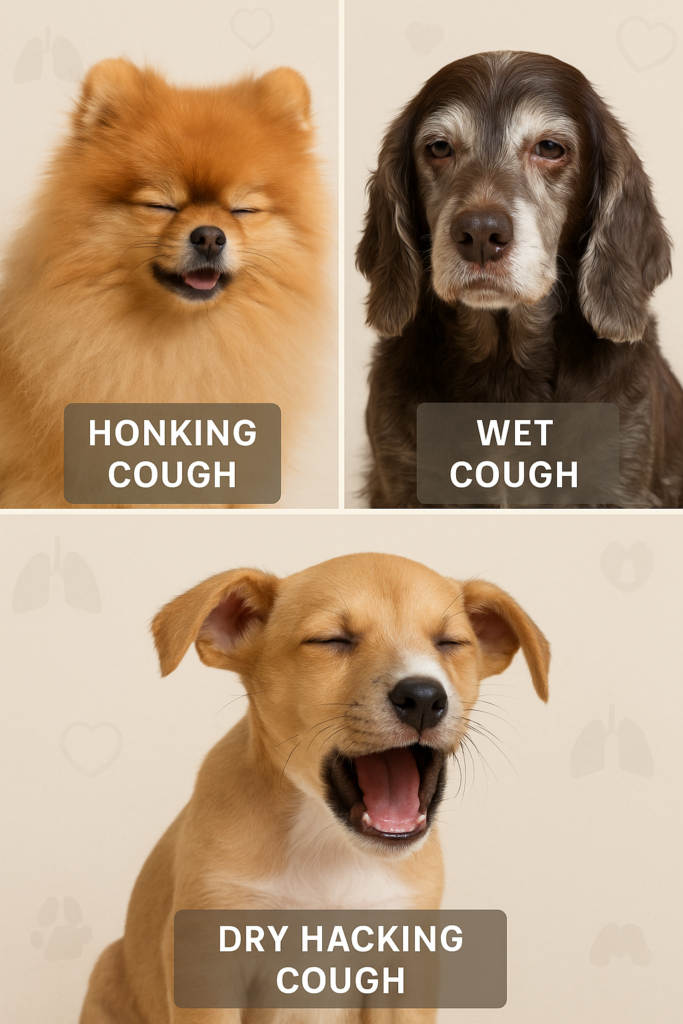
As a veterinarian, one of the most common concerns I hear from pet parents is, “Why is my dog coughing all of a sudden?” The answer can vary greatly depending on your dog’s age, lifestyle, breed, and environment. Below are the most frequent causes of dog coughing, from the benign to the serious.
Kennel Cough (Infectious Tracheobronchitis)
Kennel cough is one of the top reasons for dog coughing, especially in puppies or recently boarded dogs. Caused by bacteria like Bordetella bronchiseptica and viruses such as parainfluenza, it’s highly contagious but usually mild.
What it sounds like: A dry, hacking cough like your dog has something stuck in their throat.
Other signs: Sneezing, nasal discharge, but otherwise active and eating well.
Veterinary care: Often self-limiting in healthy dogs. Antibiotics or cough suppressants may be used.
Personal note: I often recommend a Bordetella vaccine for dogs who frequent daycare, groomers, or parks prevention is far easier than dealing with an outbreak.
👉 https://www.bluecross.org.uk/advice/dog/health-and-injuries/kennel-cough
Heart Disease
In older dogs, particularly small breeds like Cavalier King Charles Spaniels, dog coughing can be an early sign of heart disease. Fluid can accumulate in the lungs due to reduced heart function.
What it sounds like: A soft, persistent cough, worse at night or when lying down.
Other signs: Exercise intolerance, labored breathing, or fainting.
Veterinary care: Chest X-rays, an echocardiogram, and medications such as diuretics or ACE inhibitors.
Tracheal Collapse
Small dogs like Yorkies, Pomeranians, and Chihuahuas are prone to this condition. The cartilage rings supporting the windpipe weaken, leading to airway narrowing.
What it sounds like: A loud, honking cough especially when excited or pulling on a collar.
Veterinary care: Weight loss, harnesses instead of collars, bronchodilators, and in severe cases, surgery.
Allergies
Environmental allergens like dust, mold, or pollen can irritate your dog’s respiratory tract. Food allergies are less likely to cause coughing.
What it sounds like: Dry, seasonal cough with sneezing or itchy skin.
Veterinary care: Antihistamines, steroids, and identifying/avoiding triggers.
Pneumonia
More serious than kennel cough, pneumonia causes inflammation in the lungs, often due to bacteria, viruses, or aspiration.
What it sounds like: Wet, productive cough with fever and lethargy.
Other signs: Trouble breathing, lack of appetite.
Veterinary care: Hospitalization, oxygen therapy, and antibiotics.
Lungworm
Lungworm is a parasitic infection picked up by eating slugs, snails, or contaminated water. Though more common in Europe, Canadian cases are emerging.
What it sounds like: Coughing after exercise or randomly throughout the day.
Veterinary care: Diagnosis via fecal test; treatment with deworming medications.
Foreign Body
If your dog has suddenly started coughing, especially after chewing a toy or being outside, they may have inhaled something.
What it sounds like: Sudden, violent cough with possible gagging or distress.
Veterinary care: X-rays or endoscopy to remove the object don’t wait on this one.
Other Causes of Dog Coughing
Some other conditions to consider include:
- Chronic bronchitis – Common in middle-aged dogs exposed to smoke or pollution.
- Heartworm disease – Spread by mosquitoes; often silent until late-stage.
- Laryngeal paralysis – Common in older large breeds; noisy breathing and weak bark.
- Lung cancer – Persistent cough in older dogs with weight loss.
- Irritant exposure – Scented sprays, smoke, or harsh cleaners can all trigger a cough.
When to Worry: Signs Your Dog Needs a Vet
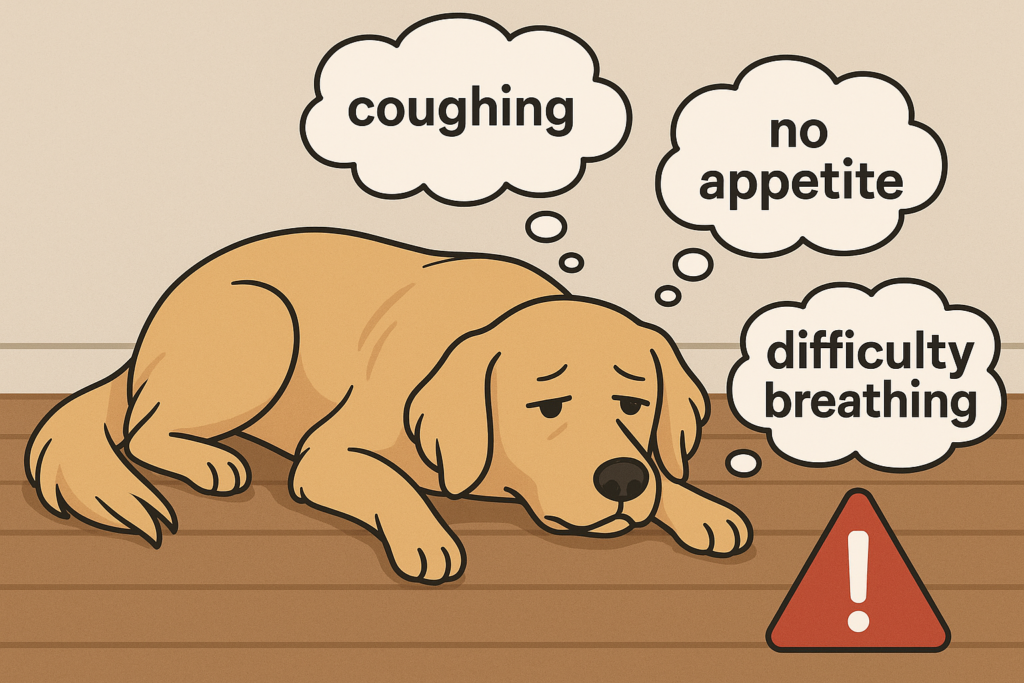
It can be tricky to know when a dog coughing episode is just a passing irritation or a signal something serious is going on. Here’s how I guide my own clients in the clinic: If the cough changes, lasts too long, or your dog seems “off,” it’s time to call us.
🚨 Red Flags That Warrant a Vet Visit
- Cough lasts more than 3–5 days
Occasional coughs can be normal, but a lingering cough needs investigation. - Cough gets worse at night or after lying down
This could indicate fluid in the lungs due to heart issues. - Your dog is coughing up white foam, blood, or mucus
These signs often point to more than a throat tickle possibly heart failure, pneumonia, or injury. - Accompanying symptoms appear:
- Lethargy or weakness
- Difficulty breathing or wheezing
- Loss of appetite
- Blue gums or tongue (a sign of low oxygen)
- Puppies, seniors, or immune-compromised dogs
These groups are more vulnerable to complications and should always be checked early.
In general, if your dog’s cough is frequent, sounds painful, or changes in any way play it safe and see your vet. A quick visit could prevent a much more serious emergency later.
5-Minute Home Cough Assessment Checklist
Before you head to the vet, here’s a quick checklist I give to dog owners at my clinic. It helps assess the situation and provides useful info to your vet.
Use this checklist if your dog is coughing, and jot down what you observe:
| ✅ Question | What to Look For |
|---|---|
| When did the cough start? | Sudden or gradual? |
| What does the cough sound like? | Honking, dry, wet, gagging, wheezy? |
| When does the coughing happen? | At night, during exercise, after eating, randomly? |
| Is your dog bringing anything up? | Foam, mucus, blood, food? |
| Any other symptoms? | Sneezing, lethargy, breathing difficulty, appetite loss? |
| Recent changes in environment or routine? | Boarding, new cleaners, outdoor exposure? |
| Is your dog vaccinated for Bordetella? | If not, kennel cough risk is higher. |
| Has your dog been on heartworm prevention? | Missed doses can increase disease risk. |
Keep a short video of the cough if you can this can be very helpful to your veterinarian during the diagnosis.
How Vets Diagnose a Coughing Dog
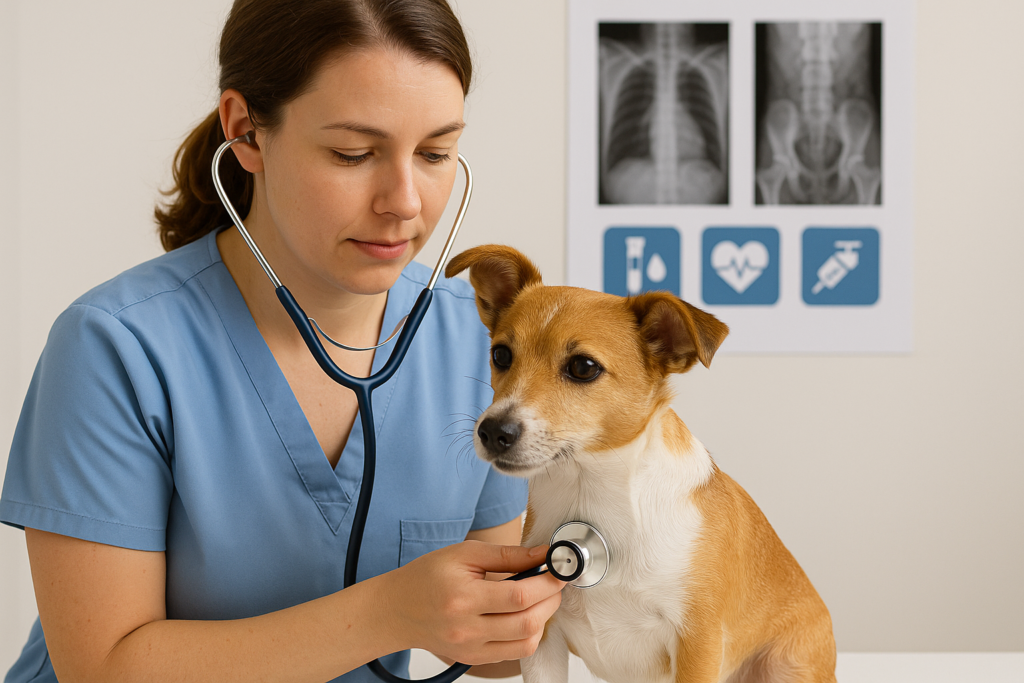
When a pet parent brings in a dog for coughing, our job as veterinarians is to pinpoint the underlying cause as efficiently and accurately as possible. Dog coughing is a symptom not a diagnosis so we rely on a combination of your observations and clinical tools.
🩺 Step-by-Step Veterinary Diagnosis
Here’s how we typically approach a coughing dog in-clinic:
1. Physical Exam & History
We start by listening to your dog’s lungs and heart with a stethoscope, checking lymph nodes, gums, and body condition. Your answers to the checklist (like timing, sound, and other symptoms) can point us in the right direction.
2. Bloodwork & Urinalysis
These tests help identify infections, inflammation, anemia, or organ dysfunction that may be contributing to the dog coughing episode.
3. Chest X-Rays (Thoracic Radiographs)
X-rays are essential in many cases. They help detect:
- Fluid in the lungs (heart failure or pneumonia)
- Masses or tumors
- Tracheal collapse
- Lung patterns typical of infection or parasites
4. Heart Testing (ECG, Echocardiogram)
If we suspect heart disease, especially in older or toy-breed dogs, we use ultrasound and ECGs to assess cardiac structure and function.
5. Fecal Exam
To rule out lungworm or other parasites, a fecal flotation or Baermann technique may be done.
6. Airway Scoping (Bronchoscopy/Endoscopy)
If needed, we can use a scope to visually examine the trachea and bronchi. This is helpful for chronic cases, suspected cancer, or foreign objects.
7. Tracheal Wash or BAL (Bronchoalveolar Lavage)
In some cases, we flush fluid into the lungs and retrieve it for lab testing. This helps identify the exact bacteria or cells involved in complex infections.
The right combination of tests depends on your dog’s age, breed, symptoms, and history. The sooner we identify the cause, the faster we can start effective treatment.
Treatment Options Based on Diagnosis
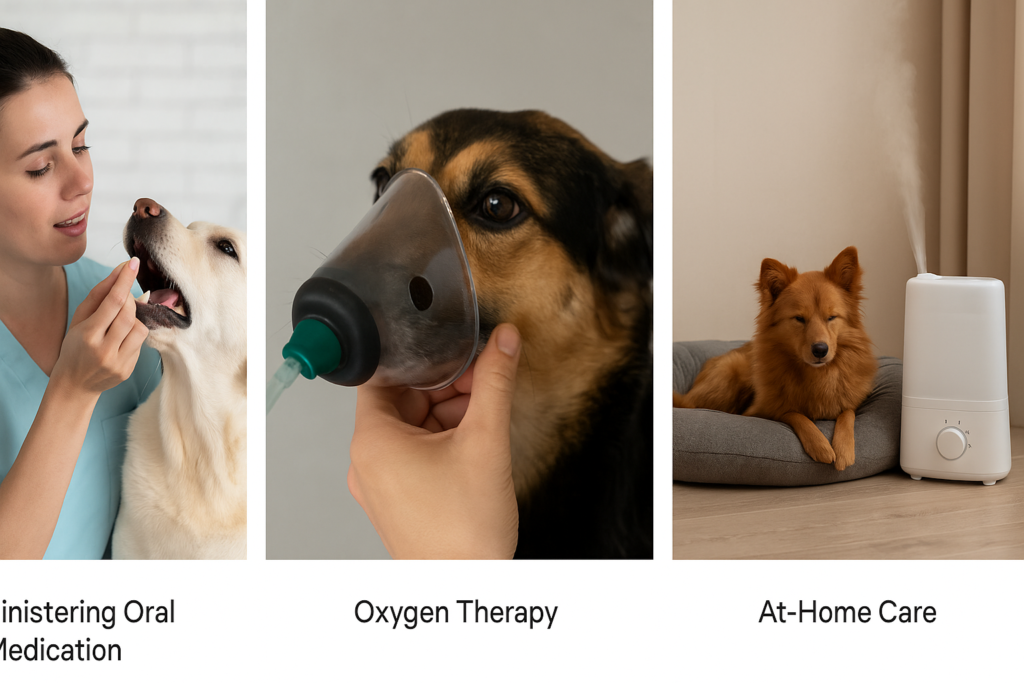
Once we’ve identified the cause of your dog coughing, we can tailor a treatment plan. Some dogs need just rest and supportive care. Others may require medications, long-term management, or surgery. Here’s how we typically treat the most common conditions behind dog coughing:
🐶 Treatment Table: Common Causes & Their Therapies
| Condition | Treatment Options |
|---|---|
| Kennel Cough | Cough suppressants, antibiotics (if bacterial), rest, Bordetella vaccine for prevention |
| Heart Disease | Diuretics (furosemide), ACE inhibitors (enalapril), pimobendan, low-sodium diet |
| Tracheal Collapse | Weight loss, harnesses (not collars), bronchodilators, cough suppressants, tracheal stents (surgery) |
| Pneumonia | Antibiotics, oxygen therapy, IV fluids, nebulization |
| Lungworm | Prescription dewormers (e.g., moxidectin, milbemycin), monthly parasite prevention |
| Chronic Bronchitis | Inhaled corticosteroids, bronchodilators, air purifiers, smoke-free home |
| Foreign Body | Emergency endoscopic or surgical removal |
| Cancer | Surgery, chemotherapy, palliative meds, or radiation, depending on type and location |
| Heartworm Disease | Adulticide injections (melarsomine), doxycycline, strict rest for 6–8 weeks |
| Laryngeal Paralysis | Surgery (tie-back procedure) in severe cases, heat/exercise restriction for mild cases |
🏡 Supportive Home Care (Always Vet-Approved First)
- Steam therapy: Let your dog inhale warm mist from a humidifier or steamy bathroom (not too hot).
- Hydration: Make water appealing ice cubes or low-sodium broth can help.
- Rest: Limit physical activity to let the body heal.
- Soothing environment: Avoid smoke, dust, and strong cleaning products.
Typical Canadian Costs for Diagnosis & Treatment of Dog Coughing
As a practicing vet in Canada, I know cost is often one of the first concerns for pet owners dealing with dog coughing. While prices can vary depending on your city or the severity of your dog’s condition, here’s a realistic breakdown of what you might expect to pay in a general practice clinic.
How to Prevent Coughing in Dogs
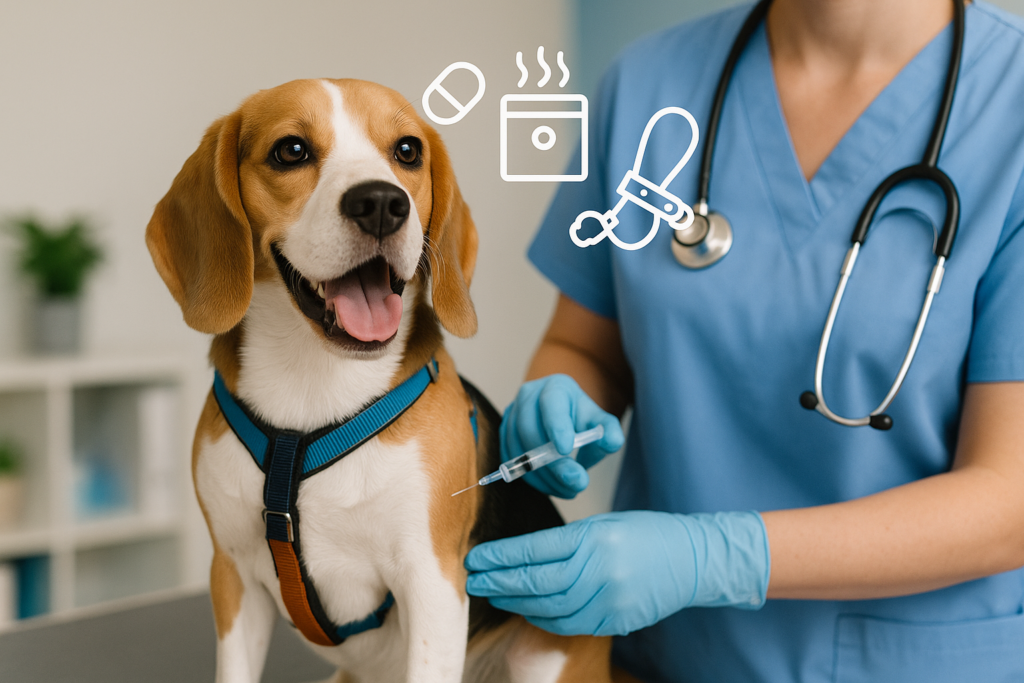
Prevention is always better than treatment especially when it comes to dog coughing. While not every cause can be avoided, many common culprits like kennel cough, heartworm, and environmental irritants can be managed or prevented with simple, consistent care.
🛡️ Vaccination & Preventative Medication
- Bordetella (Kennel Cough) Vaccine: Especially important for dogs in group settings like boarding, daycare, or grooming salons.
- Canine Influenza Vaccine: Recommended in high-risk areas or facilities that require it.
- Heartworm Preventatives: Use a monthly prescription products to protect against heartworm and lungworm.
🧼 Allergen & Irritant Control
- Avoid smoking or using aerosol sprays around your dog.
- Use air purifiers during high pollen seasons.
- Choose pet-safe cleaning products unscented and non-toxic.
- Vacuum frequently to reduce dust, mites, and mold.
⚖️ Weight & Lifestyle Management
Excess weight puts added pressure on the airway, especially for dogs prone to tracheal collapse.
- Maintain ideal body weight with measured meals and daily walks.
- Use harnesses instead of neck collars.
- Limit strenuous activity during hot or humid weather.
👩⚕️ Regular Vet Checkups
Many causes of dog coughing like heart disease or chronic bronchitis can be caught early during routine exams.
- Annual wellness exams
- Routine bloodwork for seniors
- Discuss lifestyle-based vaccine needs with your vet
🐾 Other Tips
- Avoid letting your dog drink from puddles or still water (lungworm risk).
- Supervise outdoor time to prevent chewing or inhaling foreign objects.
- Wash bedding and bowls regularly.
These steps won’t guarantee your dog never develops a cough but they greatly reduce the chances of it becoming something serious.
💰 Estimated Costs (CAD) for Common Coughing Causes
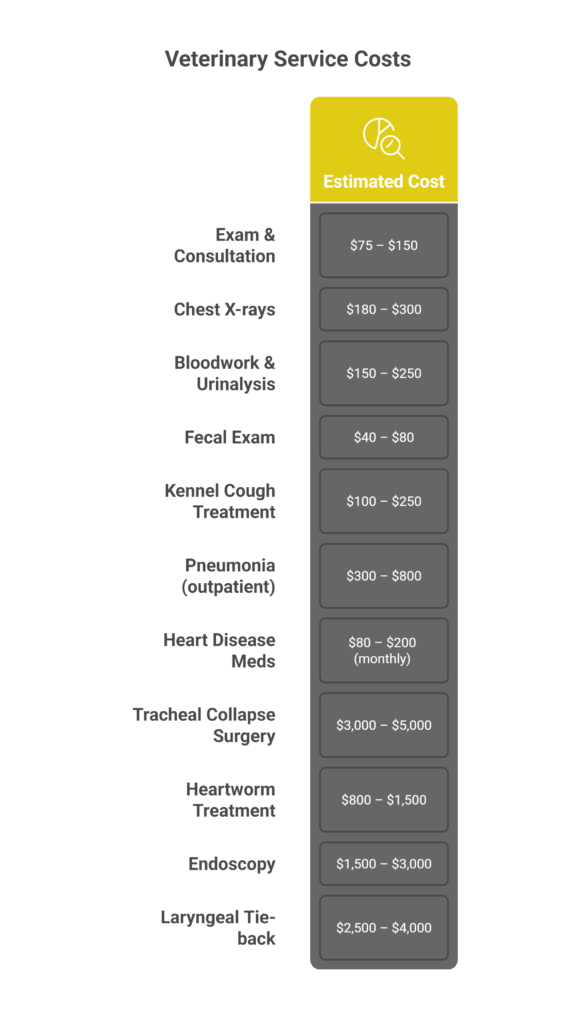
💡 Tip: Always ask for an estimate up front. Many clinics offer payment plans or accept pet insurance, which can dramatically reduce out-of-pocket costs for chronic or surgical cases.
FAQs About Dog Coughing
Here are the most common questions pet parents ask me in the exam room when dealing with dog coughing. These quick answers can help you understand what’s normal, what’s not, and when to take action.
1. Is a dog’s cough contagious to humans?
In most cases, no. Dog coughing caused by kennel cough (Bordetella) or canine influenza is contagious to other dogs but not to humans. However, immune-compromised individuals should still use caution around coughing pets.
2. Can I give my dog human cough syrup?
No—never give human medications to pets without veterinary approval. Some ingredients like xylitol or pseudoephedrine are toxic to dogs. Your vet can prescribe safe, dog-specific cough suppressants if needed.
3. Why does my dog cough only at night?
A nighttime cough, especially when your dog is lying down, may suggest heart disease or fluid in the lungs. It could also be due to allergens in bedding or air. If the cough is persistent or worsening, book a vet visit.
4. How long should I wait before seeing a vet?
If the dog coughing lasts more than 3–5 days, or if you see other symptoms (e.g., breathing difficulty, fatigue, appetite loss), contact your vet. For puppies, seniors, or immune-compromised dogs, don’t wait—get them checked right away.
5. What’s the difference between coughing and reverse sneezing?
Coughing often sounds like a dry hack or gag, while reverse sneezing is more like rapid snorting or inhaling. It’s usually harmless and short-lived, but if you’re unsure, record a video and show your vet.
Final Thoughts from a Canadian Vet
As a veterinarian practicing in Ottawa, I’ve seen firsthand how stressful it is for dog owners to hear their beloved pup coughing. The good news? Most cases of dog coughing are treatable and many are preventable.
Whether it’s a simple kennel cough picked up at the dog park or an early warning sign of heart disease, paying attention to your dog’s symptoms and acting early makes all the difference. Don’t hesitate to trust your instincts. If something seems off, even if it’s “just a cough,” get it checked.
Regular vet visits, keeping your dog at a healthy weight, staying up to date on vaccines, and using monthly heartworm prevention can go a long way in protecting your dog’s health. And remember: you know your dog best. If you’re worried, your vet wants to hear from you.
Stay observant, stay proactive, and your dog will breathe easier for years to come.

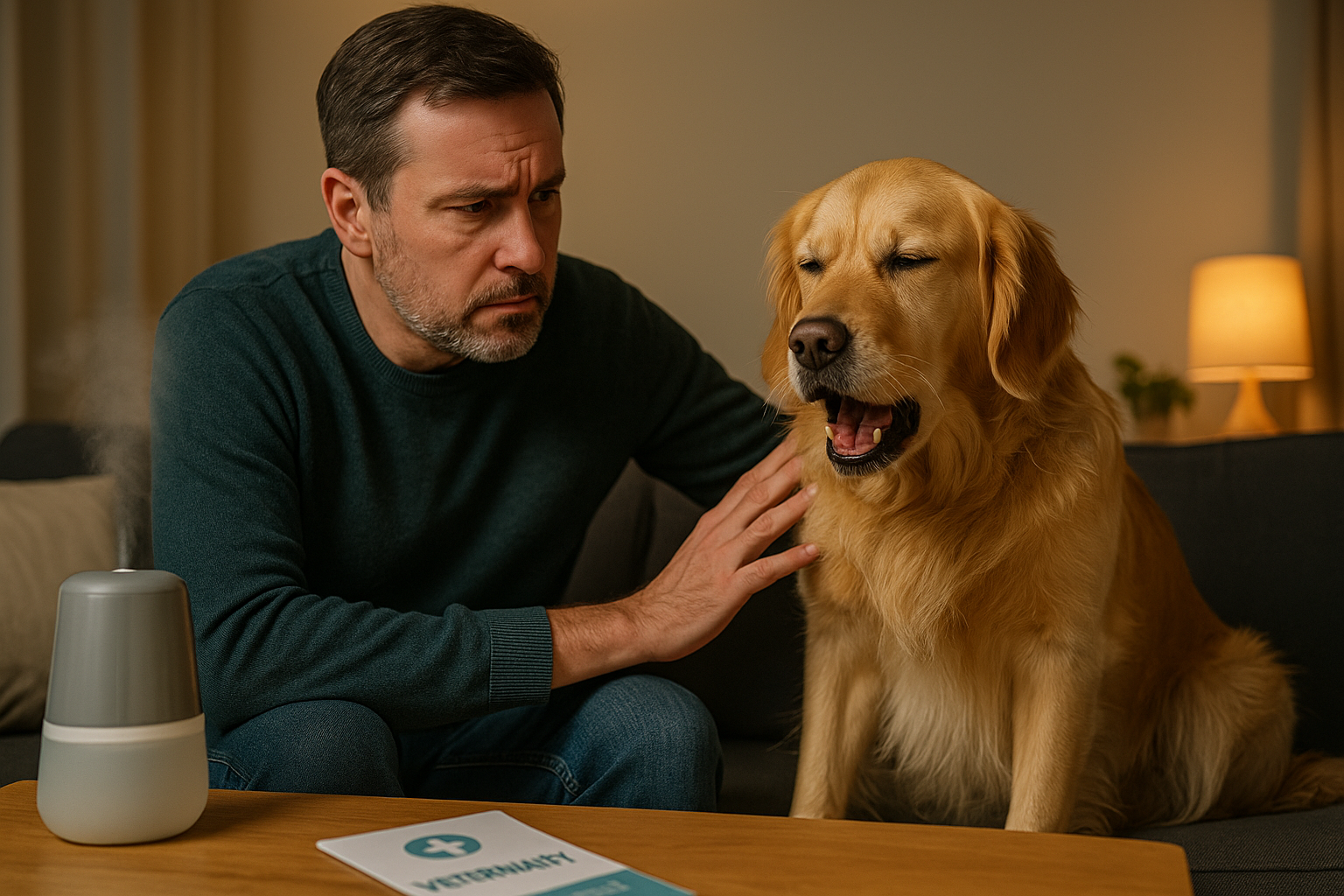
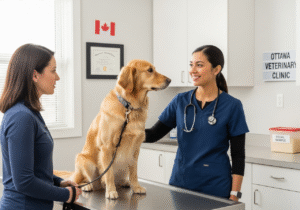
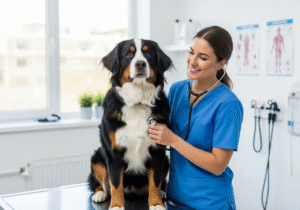
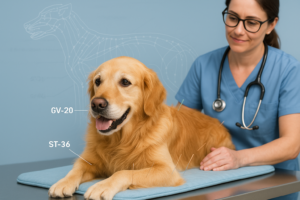
Pingback: “2025 Honest Guide to Dog Teeth Cleaning Without Anesthesia: Safe Bet or Health Risk?”
Pingback: 7 Warning Signs of Canine Heart Disease in 2025